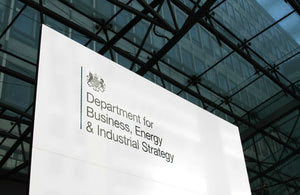New publication showcases record investment in research and development programmes

Science Minister Sam Gyimah launches new publication which highlights our ambition for public and private sector investment in R&D to reach 2.4% of GDP by 2027.
A new publication which details the allocation of the government’s increasing investment in research and innovation, highlighting the government’s ambition for public and private sector investment in R&D to reach 2.4% of GDP by 2027, was announced today (Thursday 2 August) by Science Minister Sam Gyimah.
The newly published Allocations Booklet highlights the biggest ever increase in public research and development (R&D) funding for 40 years, allowing scientists and researchers to continue pushing the boundaries of knowledge through the modern Industrial Strategy.
Recent examples of government-funded innovative programmes include breakthroughs in developing battery technologies for the future, and creating a new state of the art polar research ship that will facilitate world-leading and internationally collaborative research.
The Booklet also includes details of how increases in public R&D funding have been allocated to:
- UK Research and Innovation (UKRI)
- the UK Space Agency
- National Academies
- Public Sector Research Establishments
- and other programmes.
It also includes details of year-on-year increases in R&D across a wide range of areas, including the National Productivity Investment Fund, Official Development Assistance and science infrastructure across the UK.
Science Minister Sam Gyimah said:
We want the UK to lead on new ideas and technologies and have committed to supporting our businesses and world-leading innovators by taking measures to ensure 2.4% of GDP will be spent on research and development by 2027.
The publication of the Allocations Booklet spells out how we will ensure the benefits of this funding is felt across the science, research and innovation landscape; paving the way for disruptive businesses, entrepreneurs and researchers to flourish, boosting our economy and creating the high-value jobs of tomorrow.
The government’s commitment to reach the target of 2.4% of GDP being spent on R&D by 2027 was announced as part of the launch of the Industrial Strategy White Paper, reinforcing the UK’s commitment to our world-leading science, research and innovation sectors providing them with the necessary support to go from strength to strength.
The booklet includes the most recent allocations for a number of programmes funded and managed by UKRI, including the Industrial Strategy Challenge Fund (ISCF). UKRI is a new body which works in partnership with universities, research organisations, businesses, charities, and government to create the best possible environment for research and innovation to flourish.
UKRI Chief Finance Officer and Deputy CEO Ian Kenyon said:
UK Research and Innovation is committed to providing the best environment for research and innovation to flourish, and ensuring that the UK’s world-leading knowledge economy is harnessed to address the significant societal and industrial challenges we face both domestically and globally.
The government has recognised these challenges, and by committing significant additional funding to research and innovation is providing us with the resources we need to get on with the job at hand.
UK Research and Innovation will now focus on investing every pound of our allocations wisely, while we push the frontiers of human knowledge and create tangible economic, cultural and social impact through the activities that we fund.
UKRI’s mission is illustrated by a range of recent projects. These include
- the RRS Sir David Attenborough, a 129m-long polar research ship which will deliver world-leading research to help tackle the environmental challenges of our age, including climate change and protecting our oceans
- the UK’s ongoing leading role in the Laser Interferometer Gravitational-Wave Observatory project to detect gravitational waves, which led to the award of the 2017 Nobel Prize in Physics
- the Knowledge Exchange Hubs which successfully stimulated greater collaboration between excellent arts and humanities research and the creative industries.
A total of £1.7 billion has been committed to the first 2 waves of the ISCF, which is designed to develop UK industries that are fit for the future, driving progress in technologies where the UK can become a world-leader in their research and commercialisation. Investments so far include:
- the Faraday Challenge, to drive the development of new battery technologies
- 4 Hubs developing robotics and Artificial Intelligence technologies for use in challenging and hazardous environments
- and a range of projects stimulating the development and manufacture of novel medicines for patients.
A number of other ISCF projects will be announced in the coming months, and challenges for the third wave of the ISCF are currently being considered.
UK Research and Innovation (UKRI) is a new body which works in partnership with universities, research organisations, businesses, charities, and government to create the best possible environment for research and innovation to flourish across the UK. Comprising 9 councils, it aims to maximise the contribution of each of its component parts, working individually and collectively. It works with its many partners to benefit everyone through knowledge, talent and ideas.
The booklet sets out the budget allocations to UKRI and other funding streams managed by the Department for Business, Energy and Industrial Strategy (BEIS). The focus on UKRI means this is not intended to be a complete picture of R&D managed across government or the department as some R&D budgets reside elsewhere.
The National Productivity Investment Fund established as part of the Autumn Statement 2016 and expanded at Autumn Budget 2017, adds £31 billion across government in high-value investment from 2017-18 to 2021-22. The £7 billion of this apportioned to research and innovation funding is split between themes and includes funding for innovation and research: Industrial Strategy Challenge Fund; and other programmes such as research talent. The £7 billion investment is made up of the £4.7 billion detailed within the Allocations Booklet and the remaining £2.3 billion to be allocated in 2021-22.
Allocations for 2020-2021 onwards will be made following the Spending Review.











Responses